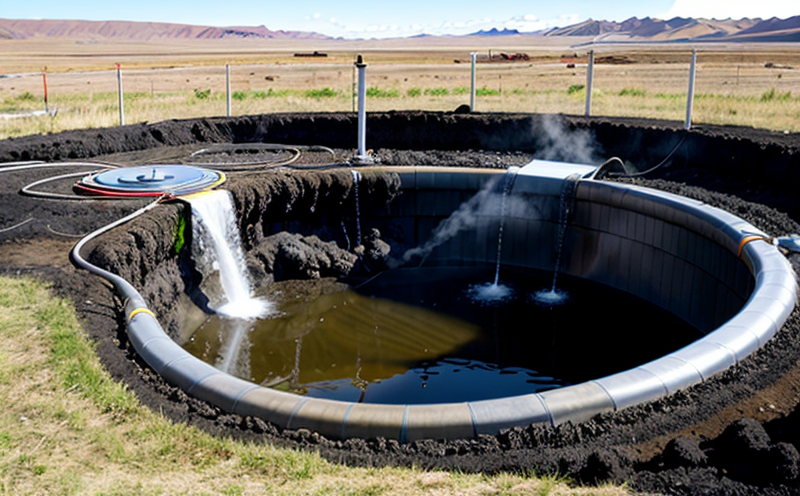
-
Renewable Energy Testing and Standards-
Geothermal Energy Testing and Standards-
Standards for Geothermal Energy Efficiency
We provide comprehensive solutions designed to help our clients mitigate risks, enhance performance, and excel in key areas such as quality, health & safety, environmental sustainability, and social responsibility.
Discover
For many years, our organization has been operating successfully, boasting modern laboratories that meet international standards. These laboratories are equipped with the latest technology devices and equipment, and we have built a strong team of experienced and trained personnel to operate them.
DiscoverWelcome to Eurolab, your partner in pioneering solutions that encompass every facet of life. We are committed to delivering comprehensive Assurance, Testing, Inspection, and Certification services, empowering our global clientele with the ultimate confidence in their products and processes.
Discover
-
Renewable Energy Testing and Standards-
Geothermal Energy Testing and Standards-
Standards for Geothermal Energy EfficiencyStandards for Geothermal Energy Efficiency: A Comprehensive Guide
Geothermal energy has emerged as a vital component of the global renewable energy mix, offering a reliable and consistent source of power. However, with the increasing demand for geothermal energy, it is essential to establish standards that ensure the efficient operation of geothermal power plants. In this article, we will delve into the various standards for geothermal energy efficiency, highlighting the key aspects and benefits.
Why Standards are Necessary
Standards play a crucial role in ensuring the reliability, safety, and efficiency of geothermal power plants. They provide guidelines for design, construction, operation, and maintenance, which ultimately contribute to the overall performance of these facilities. Without standards, geothermal energy production would be plagued by inefficiencies, leading to increased costs, reduced lifespan, and potential environmental hazards.
International Standards for Geothermal Energy Efficiency
Several international organizations have developed standards for geothermal energy efficiency. Some notable examples include:
Rock type: Different types of rocks have varying levels of thermal conductivity, which affects heat transfer rates.
Faulting: Faults can increase the risk of fluid migration and reduce the efficiency of the system.
Pressure drop: Excessive pressure drops can lead to reduced system performance and increased maintenance costs.
Heat transfer: Adequate heat transfer is critical for maintaining high conversion efficiencies.
Corrosion resistance: Materials must be resistant to corrosion from fluids and gases.
Thermal conductivity: Materials with high thermal conductivity can enhance heat transfer rates.
Key Considerations for Geothermal System Maintenance
Monitoring systems: Installation of monitoring systems enables real-time tracking of performance and detection of anomalies.
Cleaning: Periodic cleaning is required to maintain fluid flow rates and prevent scaling.
Fluid circulation: Regular circulation of fluids ensures that all parts of the system are heated evenly.
Replenishment: Monitoring and replenishing fluids as needed helps maintain optimal performance.
Benefits of Implementing Geothermal Energy Efficiency Standards
Implementing geothermal energy efficiency standards can have numerous benefits, including:

Aviation and Aerospace Testing
Aviation and Aerospace Testing: Ensuring Safety and Efficiency The aviation and aerospace industr...

Hospitality and Tourism Certification
Hospitality and Tourism Certification: Unlocking Opportunities in the Industry The hospitality and ...

MDR Testing and Compliance
MDR Testing and Compliance: A Comprehensive Guide The Medical Device Regulation (MDR) is a comprehe...

Agricultural Equipment Certification
Agricultural equipment certification is a process that ensures agricultural machinery meets specific...

Consumer Product Safety
Consumer Product Safety: Protecting Consumers from Harmful Products As a consumer, you have the rig...

Electrical and Electromagnetic Testing
Electrical and Electromagnetic Testing: A Comprehensive Guide Introduction Electrical and electrom...

Environmental Simulation Testing
Environmental Simulation Testing: A Comprehensive Guide In todays world, where technology is rapidl...

Electromechanical Safety Certification
Electromechanical Safety Certification: Ensuring Compliance and Protecting Lives In todays intercon...

IT and Data Center Certification
IT and Data Center Certification: Understanding the Importance and Benefits The field of Informatio...

Transportation and Logistics Certification
Transportation and Logistics Certification: A Comprehensive Guide The transportation and logistics ...

Renewable Energy Testing and Standards
Renewable Energy Testing and Standards: Ensuring a Sustainable Future The world is rapidly transiti...

Pressure Vessels and Installations Testing
Pressure Vessels and Installations Testing Pressure vessels are a critical component of various ind...

Military Equipment Standards
Military Equipment Standards: Ensuring Effectiveness and Safety The use of military equipment is a ...

Railway Industry Compliance
Railway Industry Compliance: Ensuring Safety and Efficiency The railway industry is a critical comp...

Fire Safety and Prevention Standards
Fire Safety and Prevention Standards: Protecting Lives and Property Fire safety and prevention stan...

Industrial Equipment Certification
Industrial equipment certification is a critical process that ensures industrial equipment meets spe...

Battery Testing and Safety
Battery Testing and Safety: A Comprehensive Guide As technology continues to advance, battery-power...

Healthcare and Medical Devices
The Evolution of Healthcare and Medical Devices: Trends, Innovations, and Challenges The healthcare...

Food Safety and Testing
Food Safety and Testing: Ensuring the Quality of Our Food As consumers, we expect our food to be sa...

Environmental Impact Assessment
Environmental Impact Assessment: A Comprehensive Guide Environmental Impact Assessment (EIA) is a c...

Trade and Government Regulations
Trade and government regulations play a vital role in shaping the global economy. These regulations ...

Product and Retail Standards
Product and Retail Standards: Ensuring Quality and Safety for Consumers In todays competitive marke...

Pharmaceutical Compliance
Pharmaceutical compliance refers to the adherence of pharmaceutical companies and organizations to l...

Automotive Compliance and Certification
Automotive Compliance and Certification: Ensuring Safety and Efficiency The automotive industry is ...

NEBS and Telecommunication Standards
Network Equipment Building System (NEBS) and Telecommunication Standards The Network Equipment Bu...

Cosmetic Product Testing
The Complex World of Cosmetic Product Testing The cosmetics industry is a multi-billion-dollar ma...

Lighting and Optical Device Testing
Lighting and Optical Device Testing: Ensuring Performance and Safety Lighting and optical devices a...

Chemical Safety and Certification
Chemical safety and certification are critical in ensuring the safe management of products and proce...

Construction and Engineering Compliance
Construction and Engineering Compliance: Ensuring Safety, Quality, and Regulatory Adherence In the ...

Energy and Sustainability Standards
In today’s rapidly evolving world, businesses face increasing pressure to meet global energy a...